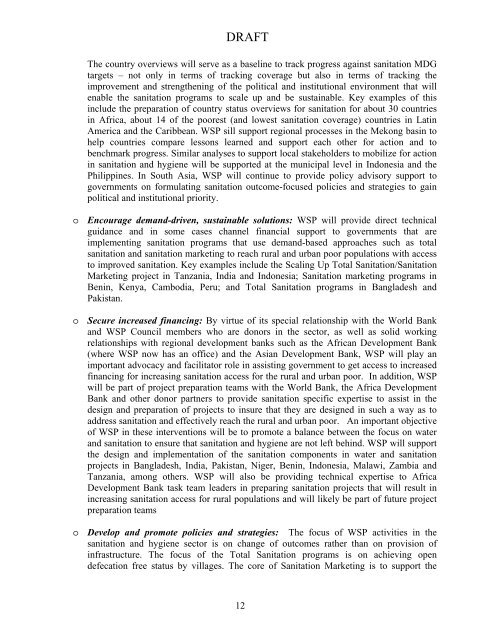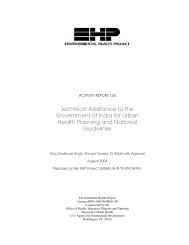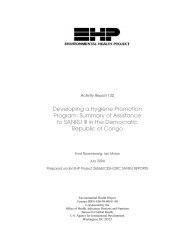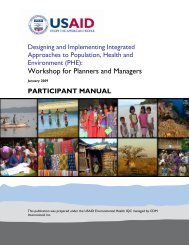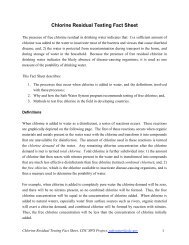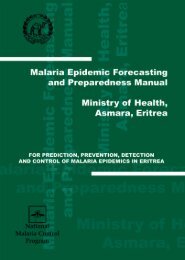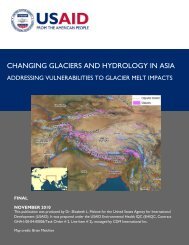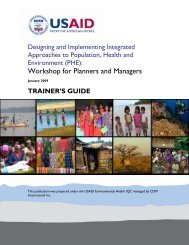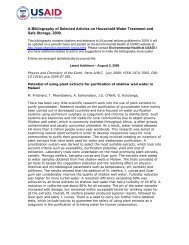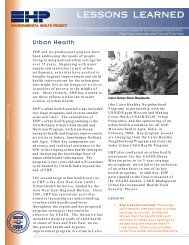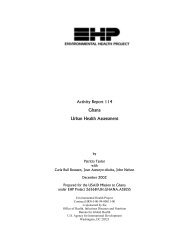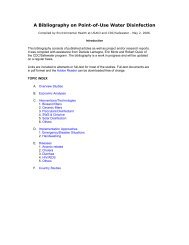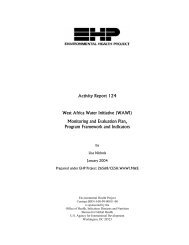The Water and Sanitation Program - Environmental Health at USAID
The Water and Sanitation Program - Environmental Health at USAID
The Water and Sanitation Program - Environmental Health at USAID
You also want an ePaper? Increase the reach of your titles
YUMPU automatically turns print PDFs into web optimized ePapers that Google loves.
DRAFT<strong>The</strong> country overviews will serve as a baseline to track progress against sanit<strong>at</strong>ion MDGtargets – not only in terms of tracking coverage but also in terms of tracking theimprovement <strong>and</strong> strengthening of the political <strong>and</strong> institutional environment th<strong>at</strong> willenable the sanit<strong>at</strong>ion programs to scale up <strong>and</strong> be sustainable. Key examples of thisinclude the prepar<strong>at</strong>ion of country st<strong>at</strong>us overviews for sanit<strong>at</strong>ion for about 30 countriesin Africa, about 14 of the poorest (<strong>and</strong> lowest sanit<strong>at</strong>ion coverage) countries in L<strong>at</strong>inAmerica <strong>and</strong> the Caribbean. WSP sill support regional processes in the Mekong basin tohelp countries compare lessons learned <strong>and</strong> support each other for action <strong>and</strong> tobenchmark progress. Similar analyses to support local stakeholders to mobilize for actionin sanit<strong>at</strong>ion <strong>and</strong> hygiene will be supported <strong>at</strong> the municipal level in Indonesia <strong>and</strong> thePhilippines. In South Asia, WSP will continue to provide policy advisory support togovernments on formul<strong>at</strong>ing sanit<strong>at</strong>ion outcome-focused policies <strong>and</strong> str<strong>at</strong>egies to gainpolitical <strong>and</strong> institutional priority.o Encourage dem<strong>and</strong>-driven, sustainable solutions: WSP will provide direct technicalguidance <strong>and</strong> in some cases channel financial support to governments th<strong>at</strong> areimplementing sanit<strong>at</strong>ion programs th<strong>at</strong> use dem<strong>and</strong>-based approaches such as totalsanit<strong>at</strong>ion <strong>and</strong> sanit<strong>at</strong>ion marketing to reach rural <strong>and</strong> urban poor popul<strong>at</strong>ions with accessto improved sanit<strong>at</strong>ion. Key examples include the Scaling Up Total <strong>Sanit<strong>at</strong>ion</strong>/<strong>Sanit<strong>at</strong>ion</strong>Marketing project in Tanzania, India <strong>and</strong> Indonesia; <strong>Sanit<strong>at</strong>ion</strong> marketing programs inBenin, Kenya, Cambodia, Peru; <strong>and</strong> Total <strong>Sanit<strong>at</strong>ion</strong> programs in Bangladesh <strong>and</strong>Pakistan.o Secure increased financing: By virtue of its special rel<strong>at</strong>ionship with the World Bank<strong>and</strong> WSP Council members who are donors in the sector, as well as solid workingrel<strong>at</strong>ionships with regional development banks such as the African Development Bank(where WSP now has an office) <strong>and</strong> the Asian Development Bank, WSP will play animportant advocacy <strong>and</strong> facilit<strong>at</strong>or role in assisting government to get access to increasedfinancing for increasing sanit<strong>at</strong>ion access for the rural <strong>and</strong> urban poor. In addition, WSPwill be part of project prepar<strong>at</strong>ion teams with the World Bank, the Africa DevelopmentBank <strong>and</strong> other donor partners to provide sanit<strong>at</strong>ion specific expertise to assist in thedesign <strong>and</strong> prepar<strong>at</strong>ion of projects to insure th<strong>at</strong> they are designed in such a way as toaddress sanit<strong>at</strong>ion <strong>and</strong> effectively reach the rural <strong>and</strong> urban poor. An important objectiveof WSP in these interventions will be to promote a balance between the focus on w<strong>at</strong>er<strong>and</strong> sanit<strong>at</strong>ion to ensure th<strong>at</strong> sanit<strong>at</strong>ion <strong>and</strong> hygiene are not left behind. WSP will supportthe design <strong>and</strong> implement<strong>at</strong>ion of the sanit<strong>at</strong>ion components in w<strong>at</strong>er <strong>and</strong> sanit<strong>at</strong>ionprojects in Bangladesh, India, Pakistan, Niger, Benin, Indonesia, Malawi, Zambia <strong>and</strong>Tanzania, among others. WSP will also be providing technical expertise to AfricaDevelopment Bank task team leaders in preparing sanit<strong>at</strong>ion projects th<strong>at</strong> will result inincreasing sanit<strong>at</strong>ion access for rural popul<strong>at</strong>ions <strong>and</strong> will likely be part of future projectprepar<strong>at</strong>ion teamso Develop <strong>and</strong> promote policies <strong>and</strong> str<strong>at</strong>egies: <strong>The</strong> focus of WSP activities in thesanit<strong>at</strong>ion <strong>and</strong> hygiene sector is on change of outcomes r<strong>at</strong>her than on provision ofinfrastructure. <strong>The</strong> focus of the Total <strong>Sanit<strong>at</strong>ion</strong> programs is on achieving opendefec<strong>at</strong>ion free st<strong>at</strong>us by villages. <strong>The</strong> core of <strong>Sanit<strong>at</strong>ion</strong> Marketing is to support the12


